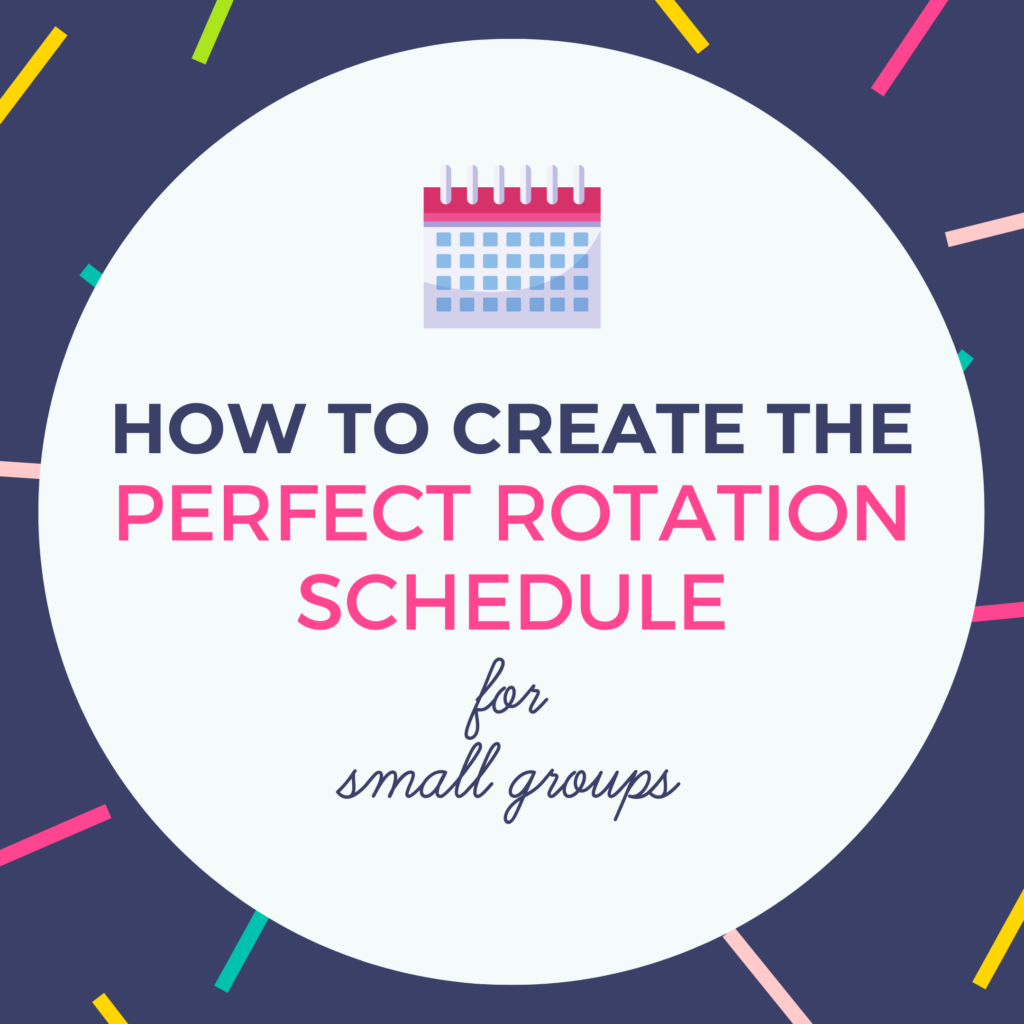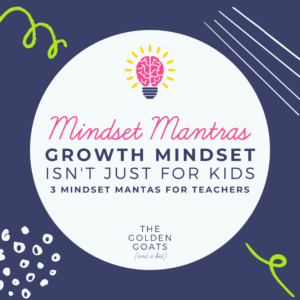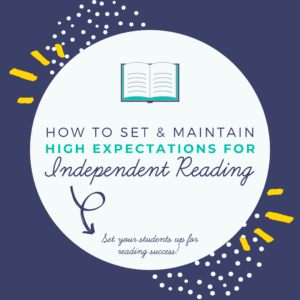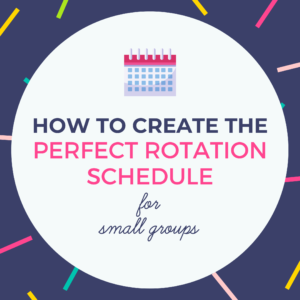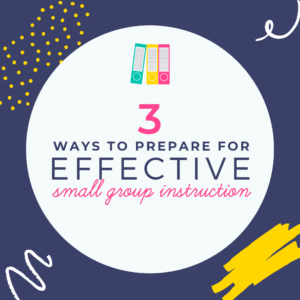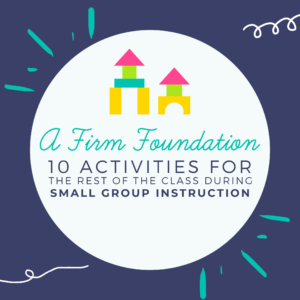Skill Groups vs. RtI Groups
First things first! Before we can dive into the nitty gritty of creating the perfect small group rotation schedule, we need to make a few distinctions. For the purposes of this post, when we refer to our small groups, we are talking about our math and reading ability small groups. Our RtI groups are done a little differently, and yours should be, too (but, that’s another topic for another day!).
Our math and reading small groups are organized by ability. You can read more about how we do that here! Our RtI small groups are based on specific skills/needs.
We recommend meeting with your math and reading small groups 3-4 times a week, with three being the absolute minimum. Your RtI groups should meet at least once per week. We always use Monday through Thursday for math and reading groups and Fridays for RtI groups.
Now, let’s dive into the details of a perfectly organized small group rotation schedule!
Using Progress Monitoring for Your Small Group Rotation Schedule
Your math and reading small groups should be restructured each month. We absolutely recommend not going past the six-week mark with any group. But, again, once a month is preferred!
One of the ways we recommend organizing your math and reading small groups is with your data gained from tests like NWEA, iReady, etc. These assessments are great for data collection. However, these tests are only given a few times a year. That certainly isn’t frequently enough for the purposes of using it as your sole point of reference for small group creation.
This is where progress monitoring comes into play!
Your progress monitoring is your key to knowing when groups need to be switched and which students need to be moved into new groups. You cannot run a successful small group rotation schedule without an arsenal of progress monitoring data!

What can I use to gather data for my small group rotation schedule?
For math progress monitoring you will want to use the following.
- Daily work
- Quizzes
- Exit slips
- Assessments (district common assessments/textbook assessments)
For ELA progress monitoring you will want to use the following. You will find additional ELA progress monitoring notes below as ELA is a little less straight forward. There are so many different layers to monitoring students’ progress in developing their literacy skills.
- Writing samples
- Running records on guided reading texts
- A variety of reading processing behaviors checklists
- Fluency checks
- Comprehension checklists
- Reading responses
For both math and ELA you will also want to use standards-based grading artifacts and good old fashioned teacher observation!
Mastering the ELA Small Group Rotation Schedule
Literacy is such a multifaceted skill to master, and there are so many moving pieces to keep track of when assessing a student’s literacy skills.
When looking at your writing samples, make sure you score them against a grade-level benchmark list. We like to keep all drafts that our students write to really see the progress of skills throughout the course of the year. This will also allow you to make well informed decisions regarding their small group placement when it comes to writing skills. You can read more about how we organize our students writing samples for small groups here.
We also like to keep all completed running records for our students in the same manner as their writing samples. We discuss how we organize these for small group in the same post as the writing samples. For the purposes of progress monitoring we recommend completing your running record after the student has already been exposed to the text or on their second read. We don’t want to take their running record on a cold read.
There are so many different behaviors and skills to be assessed when considering a child’s reading level, and we strongly recommend using a variety of different checklists for different reading processing behaviors. We use the ones found in Interventions that Work by Linda Dorn and Carla Soffos. If your school doesn’t have copies of the book or isn’t able to obtain one for you, you can find used copies on sites such as Thriftbooks for a very inexpensive price!
Fluency checks can be done in a variety of different ways. iReady has an oral reading fluency component that teachers can use, and we are liking it!
We highly recommend collecting a wide variety of different reading responses as well. These can be in the form of interactive reading logs, exit slips, quick writes, accountable talks, post-it note responses/reflections, etc. When it comes to analyzing literature, there are so many different ways to get your students to put their thinking on paper! Don’t just use the same strategy every time. Mix it up!
Old Reliable: Teacher Observation
There is nothing better than teacher observation. If you are listening to your students read and are conferring with them on a daily basis, you will know which group they belong in, and you will know when they need to be moved around. Marie Clay, in An Observation Survey of Early Literary Achievement says teachers must be sensitive observers. You need to be present each and every day when you are interacting with your students. You will hear it and see it in their analysis- observe carefully and trust your teacher gut! This goes not only for literacy skills, but all skill areas!

Behavior’s Role in Your Small Group Rotation Schedule
As teacher’s we always need to take behaviors into account when making our plans. Your small group rotation schedule is no different. If two students are of like ability, but will cause trouble in your 20 minute group each day, that will be counterproductive to what your desired outcomes are. Whomever of the two students that will perform well in a group that is slightly higher than his/her level would be moved in our class. This always allows our groups to run more smoothly, and, therefore, more effectively.
Another thing to keep in mind as you plan your small group rotation schedule, is boredom. If you leave children in the same group for too long, it can lead to problems. Stagnation can lead to complacency, apathy, and behavior problems. Have you ever walked by a stagnant pond in late August? It straight up stinks! Like really bad! Don’t let your small groups become stinky, stagnant, August ponds. Shake things up for interest’s sake if nothing else! We highly recommend switching it up once a month (every 6 weeks at the minimum)!
A Final Note
Think about the order of your groups. I like to start with my lowest group and work up. I feel like I need to be on my best game with my struggling readers. Then by the time I get to the high group, I am ready to just coast along and enjoy great literature with them! It doesn’t always work out this way, and some people like to work in the opposite direction, starting with the high group and working down to the lower group. Find a rhythm that works for you, and keep in mind that sometimes it may not work out. Flexibility is always key in the classroom!
Additional Small Group Tips:
- If you’re trying to figure out how you can possibly make time for 6 small groups a day (3 math and 3 reading), this post is for you!
- Set yourself up for small group success by working through these 3 steps to prepare for small group instruction.
- If you need tips for how to organize your students into groups, read this post!
- Not sure what to do with the rest of the class while you run your small groups, here are 10 ideas that make the most of your time and your students’ time!

